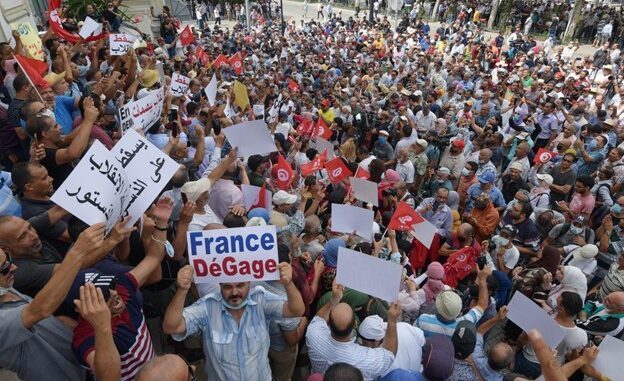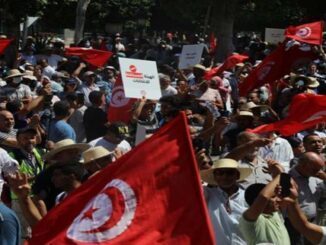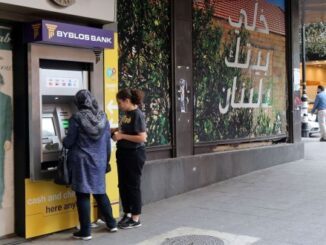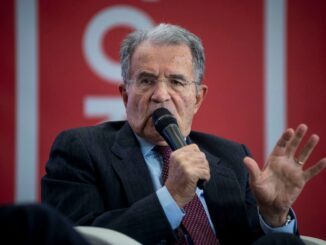
Tunisian demonstrators in Tunis chanted ‘the people want the coup to fail’ and called for restoration of parliament
Hundreds of Tunisians took to the streets in the capital, Tunis, on Saturday to protest against President Kais Saeid’s July power grab, demanding an end to his “exceptional” procedures, Anadolu Agency reported.
Several activists, politicians and human rights defenders took part in the protest, which took place in front of the Municipal Theater in Habib Bourguiba Avenue in central Tunis.
The demonstrations follow weeks of political unrest in the wake of the president’s decision on 25 July to suspend the parliament, lift MPs immunity and assume executive power in the country in what opponents have branded a “coup”.
On July 25, Saied ousted the government, suspended parliament, and assumed executive authority. While he insists that his exceptional measures are meant to “save” the country, his critics accuse him of orchestrating a coup.
“No to coup against state institutions”, “No to retracting from legitimacy” and “The power belongs to the people” were among banners waved by the demonstrators during Saturday’s protest.
The demonstrators rallied outside the national theatre on Habib Bourgiba street, chanting “the people want the coup to fail” and holding placards calling for the restoration of parliament and democracy.
The boulevard, which was an epicentre of the 2011 Arab Spring protests that saw the overthrow of long-term ruler Zine El Abidine Ben Ali, has a strong symbolic presence in Tunisia’s political imagination.
An independent member of parliament, Ayyad Al-Loumi, who took part in the protest, told Anadolu Agency that the rally was a show of opposition to Saied’s “coup”.
“The basic request today is to end the coup, to end the exceptional measures, and to end the suspension of parliament,” he said.
He added, “The coup against the constitution made the president isolated, and he cannot run the state on its own.”
Amira, a protester, said she rejects the “circumventing of the constitution and the disruption of the functioning of state institutions.”
Tunisia has been seen as the only country that succeeded in carrying out a democratic transition among Arab countries which witnessed popular revolutions toppling ruling regimes, including Egypt, Libya, and Yemen.
Many Tunisian politicians and activists had called for demonstrations, including former Tunisian President Moncef Marzouki, who called for peaceful marches in front of Tunis’s municipal theatre “in defense of the state and the revolution’s constitution”.
Marzouki has often referred to Saied’s power grab as a “coup”.
Though many Tunisians welcomed Saied’s move to dissolve the deeply unpopular parliament, his failure since 25 July to name a prime minister or offer a long-term plan has led to increasing frustration.
Kais Saied has justified his actions as a “course correction” after major demonstrations broke out across the country in July against high unemployment, corruption, and what was seen as an ineffectual political class.
On Tuesday, Saied said he would not “deal and negotiate with agents and traitors and those who pay money to offend their country”.
“This is a state with two regimes, an apparent regime, that of the institutions, and a real regime, that of the mafia,” he said, seemingly in reference to Ennahda.
Several human rights groups have raised concerns about Saied’s actions, warning of increasing authoritarianism.
Human Rights Watch (HRW) and the Tunisian Association for the Defense of Individual Liberties have both issued warnings about the growth of “arbitrary and politically motivated acts of repression” after 25 July.
Eric Goldstein, Executive Director of HRW’s Middle East and North Africa division warned that the president’s pledges on human rights rang “hollow.”
“President Saied’s reassurances on human rights sound hollow when he concentrates power in his own hands, parliamentarians and other Tunisians suddenly start facing arbitrary restrictions on their freedom, and some are packed off to prison,” he said in a statement last week.
The most recent of these violent arrests occurred on 17 September, when Tunisian lawyer Seifeddine Makhlouf was forcibly bundled into the back of a vehicle by five unidentified men.
Similarly, a report released by the Council of Independent High Authority for Audio-Visual Communication (HAICA) revealed an overall “lack of adherence to pluralism, diversity, and balance” in reporting on the country’s political situation following the power grab.
Significant concerns were made about breaches of people’s right to information and free speech.
The report said Al-Wataniya Station One, a public national television channel, gave 93 percent of its screen time to supporters of President Said, compared to only 7 percent for his opponents.
Overall, the President’s supporters have received 78 percent of all media appearances since 25 July, while the opposition has received just 22 percent of airtime.



